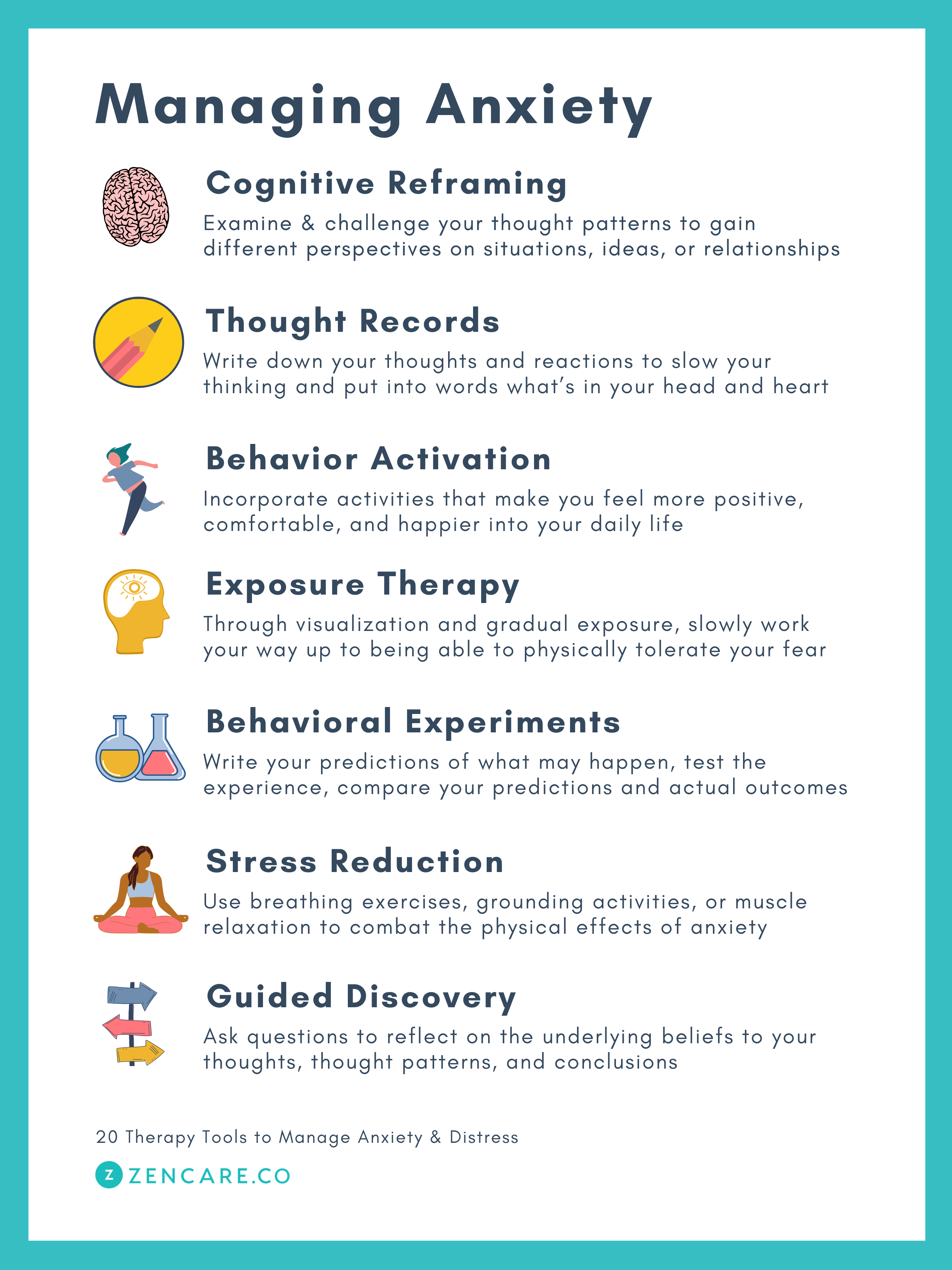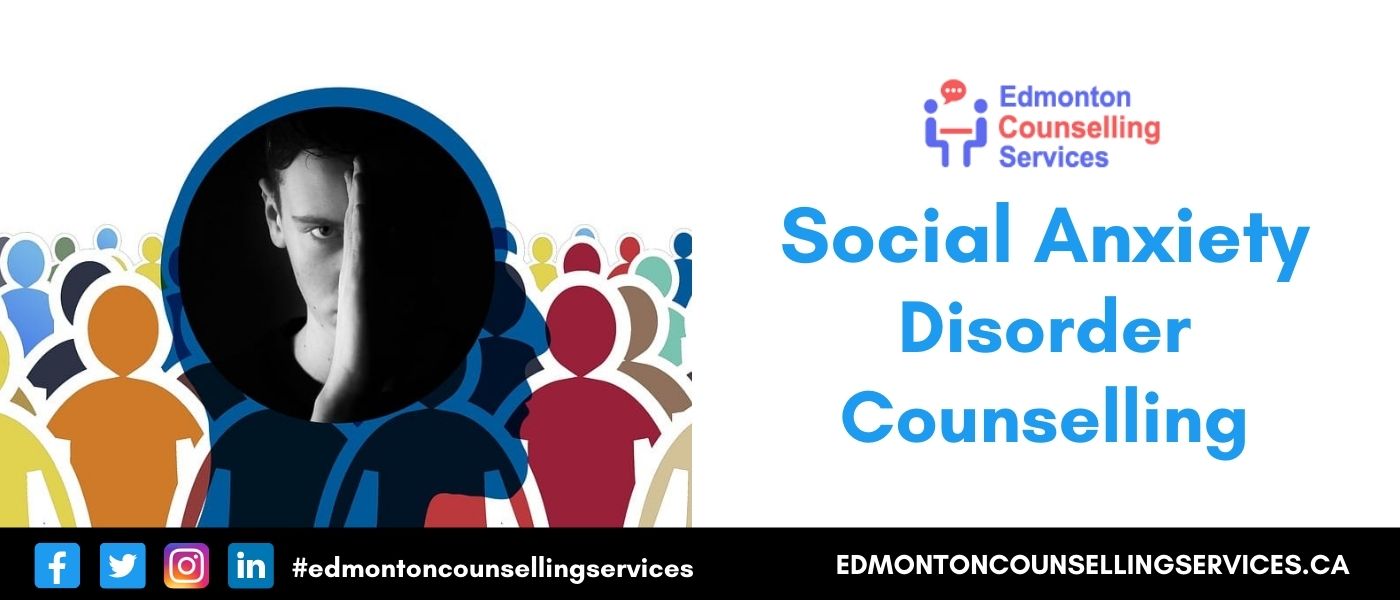Explore research-backed techniques through counselling for anxiety disorder programs
Explore research-backed techniques through counselling for anxiety disorder programs
Blog Article
Exploring Different Strategies in Therapy for Anxiousness Disorder for Long-term Change
When taking on anxiety conditions, it's important to explore a range of counseling techniques. Each method uses distinct understandings and devices to aid you handle your signs and symptoms successfully. You might discover that incorporating strategies can yield the most effective results. However, understanding the subtleties of these methods is essential to promoting long-term change. What if the ideal combination could launch a new level of psychological health for you?
Understanding Anxiousness Disorders: A Brief Review
Anxiety conditions, which influence millions of individuals worldwide, can significantly influence life. You may experience frustrating feelings of worry or worry that appear unmanageable. These feelings can result in physical signs and symptoms like an auto racing heart, sweating, or even wooziness. Typical kinds of anxiety problems consist of generalized anxiety problem, panic attack, and social anxiety condition. Each has unique signs, however they all share a tendency to disrupt your routine and relationships.Understanding the origin of your anxiety is crucial. It could stem from genetics, brain chemistry, or life experiences. Acknowledging your triggers can assist you manage your actions much better. It's vital to keep in mind that you're not alone in this battle. Many individuals face comparable obstacles, and looking for aid is a solid step towards feeling better. By learning more about anxiety conditions, you're already on the course to understanding and managing your condition much more effectively.
Cognitive-Behavioral Therapy: Testing Adverse Idea Patterns

Recognizing Negative Thought Triggers
When you run into moments of distress, identifying the particular triggers behind your negative ideas can be vital in managing anxiousness. Beginning by taking notice of scenarios that provoke feelings of fear or concern. Is it a jampacked area, a forthcoming deadline, or a discussion with certain individuals? Write down these circumstances in a journal. This will certainly help you determine patterns in your reasoning. Notice physical feelings that accompany your unfavorable ideas, like a racing heart or tightness in your upper body. By pinpointing these triggers, you acquire understanding into what's sustaining your anxiousness. Understanding these connections is the primary step in challenging those thoughts and eventually restoring control over your psychological responses.

Replacing Thoughts With Positives
Challenging unfavorable idea patterns is an important action in changing your state of mind and reducing anxiety. You might commonly find yourself caught in cycles of insecurity or disastrous reasoning. As opposed to allowing these ideas determine your sensations, practice changing them with reasonable options or positive affirmations. When you think, "I can't handle this," change it to, "I can manage difficulties one action at a time." This basic change can significantly affect your emotional state. Frequently recognizing and countering these negative thoughts aids create a healthier internal discussion. Keep in mind, it requires time and effort, but regularly exercising this technique can bring about lasting change, encouraging you to encounter anxiety with renewed self-confidence and strength
Building Coping Methods With Each Other
Replacing unfavorable ideas is just the beginning of handling anxiety properly. To create long-term adjustment, you need to build coping methods that empower you. Cognitive-Behavioral Therapy (CBT) helps you recognize and challenge those unhelpful idea patterns. Together, you and your counselor can explore how these ideas influence your sensations and behaviors.Start by establishing functional strategies, like journaling or mindfulness exercises, that enable you to confront stress and anxiety head-on. When you encounter your concerns gradually, you'll find out to respond in different ways.

Mindfulness and Acceptance-Based Approaches: Cultivating Present-Moment Understanding
As you navigate the intricacies of anxiety, incorporating mindfulness and acceptance-based methods can significantly improve your ability to grow present-moment understanding. By concentrating on the here and currently, you'll discover that you can observe your thoughts and feelings without judgment. This practice assists you recognize your anxiety without really feeling overwhelmed by it.Engaging in mindfulness workouts, such as deep breathing, body scans, or led reflections, permits you to ground on your own in your present experience. Acceptance-based approaches motivate you to embrace your emotions instead of battle versus them. When you accept your feelings, they lose their power over you.Incorporating these methods into your everyday routine can change exactly how you react to anxiety. You'll establish strength and find out to browse demanding situations with higher convenience. Inevitably, cultivating present-moment recognition lays the foundation for enduring adjustment, encouraging you to lead an extra fulfilling life.
Direct Exposure Treatment: Facing Fears Progressively
Exposure therapy helps you face your concerns in a progressive method, making it much less frustrating. You'll discover methods to face anxiety-provoking situations step by step, while additionally building coping techniques to manage your responses. This technique encourages you to take control and lower anxiousness with time.
Progressive Exposure Techniques
When facing anxiousness, gradually confronting your concerns can be an effective means to gain back control. This technique, referred to as gradual exposure, involves gradually revealing yourself to the scenarios or objects that trigger your stress and anxiety. Beginning with less daunting situations and gradually function your means approximately more challenging ones. For instance, if you're worried of public speaking, you could begin by talking in front of a mirror, after that proceed to sharing ideas with a friend, and ultimately address a tiny team. Each step helps desensitize you to the fear, developing your self-confidence over time. Keep in mind, it's vital to pace on your own and commemorate tiny triumphes as you relocate with this process, reinforcing your capacity to take care of anxiousness successfully.
Building Coping Methods
Building effective coping strategies is essential for handling anxiousness, particularly as you confront your concerns gradually. One effective approach is exposure therapy, where you start by encountering your fears in a regulated manner. Start with less frightening situations and slowly function your method approximately even more tough circumstances. This steady direct exposure assists desensitize you to anxiety triggers, making them much less overwhelming.Incorporate relaxation methods, such as deep breathing or mindfulness, to relax your mind throughout exposure. Track your progress, commemorating little triumphes along the road to enhance your self-confidence. Keep in mind, it's all right to take your time; the objective isn't perfection but consistent renovation. By developing these strategies, you'll empower yourself to navigate anxiousness and accept life a lot more fully.
Psychodynamic Treatment: Revealing Origin Reasons of Anxiety
Psychodynamic therapy explores the unconscious mind, revealing the origin of your anxiousness - Counseling services for anxiety. By examining your thoughts, sensations, and previous experiences, this strategy assists you uncover underlying problems and unresolved concerns that may add to your current stress and anxiety. You'll deal with a specialist to investigate childhood years experiences, connections, and psychological patterns that shape your responses today.As you acquire understanding into these deeper layers of your mind, you'll start to recognize how previous occasions influence your existing habits. This understanding can bring about catharsis, allowing you to refine emotions you could have suppressed.Through the restorative relationship, you can also recognize defense reaction that might have developed over time, providing a more clear course to alter. Eventually, psychodynamic treatment outfits you with the tools to address your stress and anxiety at its core, advertising enduring transformation in your psychological well-being
Holistic and integrative Approaches: Integrating Techniques for Greater Effectiveness
Integrating different restorative strategies can enhance your trip toward handling anxiety a lot more properly. By combining aspects from cognitive-behavioral therapy, mindfulness practices, and holistic strategies, you can develop a personalized method that resolves your unique demands. You might utilize cognitive-behavioral strategies to challenge adverse thought patterns while incorporating mindfulness exercises to ground on your own in the existing moment.Additionally, discovering alternative methods such as yoga or reflection can advertise relaxation and reduce anxiety signs. This blend enables you to create higher self-awareness and resilience.Experimenting with these varied methods can assist you uncover what resonates most with you. Keep in mind, it has to do with finding a synergy that works, instead of staying with a single technique. This integrative strategy not just uses instant relief but also promotes long-lasting skills for handling anxiousness, encouraging you to reclaim control over your life.
The Duty of Support Systems: Structure Durability Via Connection
While it might appear that handling anxiousness is a solitary journey, having a solid support group can play a vital function in your strength. Surrounding yourself with compassionate buddies, family, or support teams creates a risk-free room where you can freely share your feelings and experiences. You advise on your own that you're not alone in this struggle.These connections provide inspiration and can offer useful coping methods that have functioned for others when you connect with others. It's also an opportunity to get perspective; buddies can help you see situations differently, lowering sensations of isolation.Moreover, emotional support promotes a feeling of belonging, which can considerably ease stress and anxiety signs and symptoms. By leaning on your support system, you can construct resilience and deal with difficulties a lot more efficiently. Remember, connecting for aid is an indicator of toughness, and it can make all the difference in your trip towards taking care of stress and anxiety.
Regularly Asked Concerns
What Are the Usual Symptoms of Anxiousness Disorders?
You may experience restlessness, exhaustion, trouble concentrating, impatience, muscle mass tension, and sleep disturbances. Physical symptoms can include rapid heartbeat, sweating, and shivering. Acknowledging these signs early can aid you seek ideal support and therapy.

The Length Of Time Does Therapy Generally Last for Stress And Anxiety Problems?
Treatment for anxiousness disorders normally lasts anywhere from a couple of weeks to numerous months. It really depends upon your specific needs, progress, and the strategies your therapist utilizes to aid you manage your anxiousness properly.
Can Medicine Be Utilized Along With Treatment for Anxiousness?
Yes, drug can most definitely be utilized alongside treatment for stress and anxiety. Combining both methods usually enhances treatment effectiveness, assisting you manage symptoms while discovering underlying issues through counseling. Always consult your doctor for individualized get more info advice.
Are There Self-Help Techniques for Taking Care Of Stress And Anxiety?
Yes, there are a number of self-help methods for handling stress and anxiety. You can exercise mindfulness, participate in normal workout, maintain a balanced diet, develop a regular, and use deep breathing methods to help in reducing stress and anxiety signs properly.
Exactly how Do I Know if I Required Specialist Aid for Anxiety?
You should take into consideration looking for professional help for anxiousness if it interferes with day-to-day live, creates substantial distress, or if self-help methods aren't functioning. Trust fund your instincts; connecting can bring about much better coping skills and assistance. Common kinds of anxiety disorders consist of generalized anxiety disorder, panic disorder, and social stress and anxiety condition. When you come across minutes of distress, acknowledging the certain triggers behind your unfavorable thoughts can be important in handling anxiety. Changing unfavorable ideas is just the start of managing anxiousness effectively. By examining your ideas, sensations, and past experiences, this strategy helps you reveal underlying conflicts and unsettled problems that may contribute to your present anxiety. It's also an opportunity to obtain point of view; pals can help you see circumstances in different ways, decreasing sensations of isolation (Counseling services for anxiety).Moreover, emotional assistance cultivates a sense of belonging, which can greatly reduce anxiety signs and symptoms
Report this page